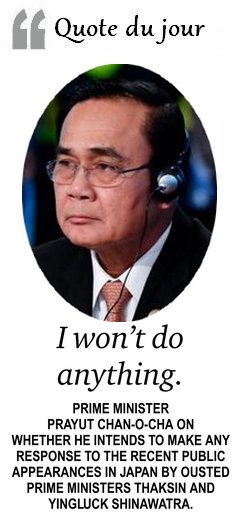
Prime Minister Prayut Chan-o-cha has admitted for the first time he could be "outsider premier" after a general election scheduled to take place in February next year.
His remark was in response to Democrat leader Abhisit Vejjajiva's earlier comment that the party would not welcome anyone who supports Gen Prayut to return as an "outsider prime minister" after the general election.
The phrase refers to a nominee who is not on the list of political parties and is voted in by a majority in both the House and Senate.
Speaking after a cabinet meeting, Gen Prayut urged the public to wait and see for themselves if the Democrats would make an about-face on the matter after the poll, which is expected in February.
"Be careful what you say. People will make up their own minds about whether they will support me or not. People should wait and see what happens, and whether they change their position," he said.
Political pundits say this indicates Gen Prayut believes Mr Abhisit would support him to return as premier.

Gen Prayut was referring to Mr Abhisit's remarks about the Democrat Party severing ties with its former MPs who were thinking of returning to the party but who also wish to support Gen Prayut's potential bid to hang onto political power.
Mr Abhisit's comment was interpreted as a snub to the party's former politicians, who took part in the mass protests organised by the People's Democratic Reform Committee (PDRC) against the former Yingluck Shinawatra administration from late 2013 to early 2014, prior to the coup engineered by the National Council for Peace and Order (NCPO), of which Gen Prayut is the head.
The prime minister also said he would not revoke a Section 44 order issued to amend the so-called organic law on political parties. However, he said he would consider making changes to ease the administrative problems facing existing and new parties since Sunday.
He said the Council of State -- the government's legal advisory body -- the Election Commission (EC) and the Constitution Drafting Committee were discussing these problems and would soon propose a solution to the NCPO.
Gen Prayut was referring to Order No.53/2017, which he invoked in his capacity as chief of the NCPO on Dec 22 of last year to amend the aforementioned law.
The power to issue such orders existed under the previous interim charter but has been carried over to the current constitution.
However, it has been met with fierce criticism from various parties, particularly the Pheu Thai and Democrat parties. They shared the view that the order violates the basic right to party membership guaranteed by the constitution and creates excessive burdens on parties.
They have called for a swift and total lifting of the ban to allow Thai politics to proceed smoothly after it was partially revoked on April 1. Activities which are permitted from April include updating party memberships.
The Section 44 order has sparked a variety contentious issues.
In particular, the requirement for party members to produce letters confirming their membership and an order that they pay party fees by April 30 or lose their status may violate their basic rights and cause additional hardship, critics say. Many pundits consider the April 30 deadline overly tight.
Parties are also required to hold general assemblies, elect leaders and executives, write a manifesto and regulations, and set up provincial branches within 90 days of the NCPO ban being lifted.
The order also allows the EC to extend the 90-day deadline only once. After that, those parties which fail to complete the required processes will have their status terminated.
The Office of the Ombudsman last Friday decided to seek a Constitutional Court ruling on whether the order violates the constitution.
The decision was prompted by petitions submitted by the Democrat and Pheu Thai parties. Both hope to have the order revoked.
NLA president Pornpetch Wichitcholchai said Tuesday he has to submit the organic bill on the election of MPs to the Constitutional Court for a validity check after the prime minister sent it back to the assembly.
Accompanying the bill was a petition for a review by the court signed by 27 lawmakers supporting the validity check, Mr Pornpetch said.
The bill was approved earlier by the NLA, which felt it did not need vetting by the charter court. It was then forwarded to the premier, who is supposed to present it to the King for royal endorsement.
However, the NLA made an about turn last week in agreeing it should first be checked by the court.
The move has raised concern that the election roadmap will be pushed back beyond February.
Mr Abhisit expressed dissatisfaction Tuesday with the NCPO's hesitation to allow parties to resume political activities.
